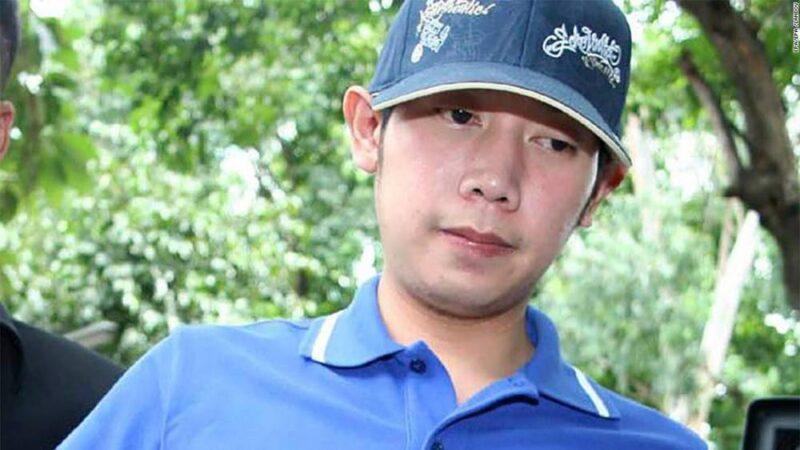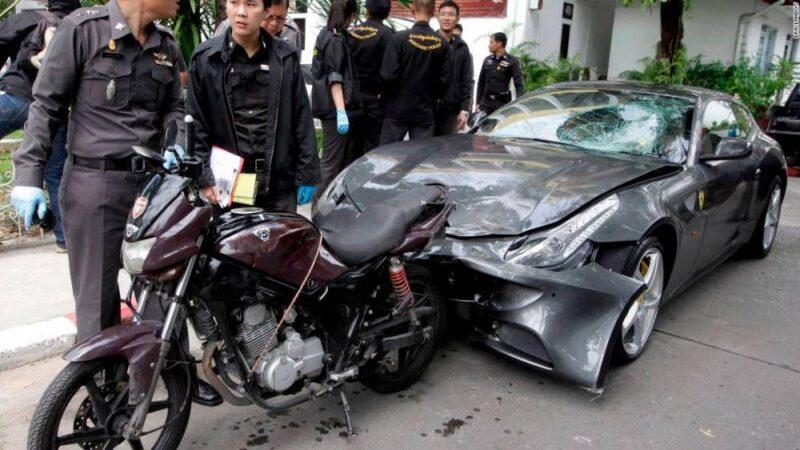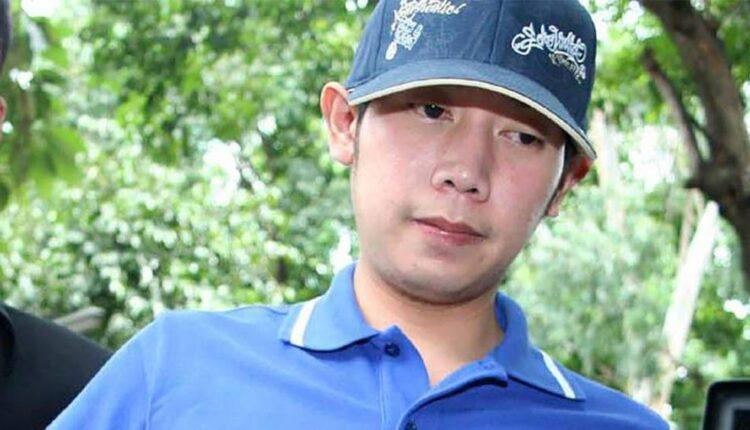Before dawn on September 3, 2012, a roaring black Ferrari struck a police motorcycle in downtown Bangkok, knocking the officer to the ground and dragging his body down the darkened street before speeding away.
According to police, a trail of oil leaking from the sports car led investigators to the luxury home of one of Thailand’s wealthiest families, the co-owners of the Red Bull energy drink empire. The man driving the Ferrari, police say, was Vorayuth “Boss” Yoovidhya, the heir to a family fortune that Forbes estimates to be worth $20.2 billion.Vorayuth was subsequently charged with five criminal counts, including speeding, hit-and-run, and reckless driving causing death, but the case stalled for years as the billionaire scion repeatedly missed or postponed prosecutors’ summonses. Authorities believe he left Thailand in 2017.

Vorayuth Yoovidhya is arrested at Thong Lor police station in Bangkok, Thailand, on September 3, 2012. For years, the family of the police officer killed in the crash, Sgt. Major Wichien Klanprasert, were left in limbo.Read MoreThen on July 23, Colonel Sampan Luangsajjakul of the Royal Thai Police confirmed that the Office of Attorney General (OAG) had decided to drop all charges against Vorayuth, who police have confirmed was aged 30 at the time of the accident, not 27 as they previously said.
The decision to drop the charges thrust the case back into the spotlight — and angered Thais who have long felt that the country’s legal system unfairly favors the rich. Some called for a boycott of Red Bull products. Others said the decision not to prosecute Vorayuth was the latest and most blatant confirmation of a perceived culture of impunity of the elite in Thailand.
“The public sentiment is that there are different standards when it comes to the rich and the poor.”Ekachai Chainuvati, law lecturer at Siam University in Bangkok
“The public sentiment is that there are different standards when it comes to the rich and the poor,” said Ekachai Chainuvati, a law lecturer at Siam University in Bangkok.Since then, public pressure has mounted, prompting multiple inquiries by the OAG, police, the lower House of Parliament and Prime Minister Prayut Chan-ocha, who vowed to “ensure justice in Thai society without dividing it along social class lines.”From there, the story has veered wildly — from the death of a key witness to the OAG’s decision to instruct police to investigate Vorayuth for two potential charges that could lead to his indictment.Through it all, the young heir and his immediate family have maintained their silence. But at a time of reignited protests for political change, many people are demanding more accountability for the actions of the rich and powerful at the very top of Thai society.
A life of luxury
Better known by his nickname “Boss,” Vorayuth grew up in one of Thailand’s most prominent families. His grandfather, the late Chaleo Yoovidhya, created the Red Bull energy drink — a fizzy mix of vitamins, sugar, and caffeine — and built it into a global empire. Born to impoverished Chinese immigrants in northern Thailand, the self-made billionaire started his career selling pharmaceutical supplies. In 1956, he founded his own company, TC Pharmaceutical, which developed over-the-counter drugs for headaches and fever. Chaleo soon became convinced a bigger market was out there for energy drinks. He invented Krating Daeng, a sweet, caffeine-powered beverage that first became popular with day laborers and truck drivers.

A Thai man drinks a bottle of Krating Daeng, an original Thai version
of popular drink Red Bull, in a store in Bangkok in July 2001.In 1984, Chaleo teamed up with Austrian entrepreneur Dietrich Mateschitz and later launched Red Bull, a carbonated version of Krating Daeng that would become a hit among athletes, partygoers, college students and late-night workers worldwide.
After Chaleo’s death in 2012, his son Chalerm Yoovidhya took over the business, according to Forbes. Chalerm and his family currently rank second on the site’s list of 50 richest Thais, behind the agribusiness behemoth of the Chearavanont brothers.The Yoovidhya family owns about half of the Red Bull global business, which sold 7.5 billion cans of the drink across 171 countries in 2019. The family’s empire includes real estate interests, restaurants, a winery and Thailand’s only official importer of Ferrari cars.The parent company of the Thai Red Bull brand, TCP Group, has tried to distance itself from the controversy around the alleged hit and run. In a statement, it said Vorayuth had “never assumed any role in the management and daily operations of TCP Group, was never a shareholder, nor has he held any executive position within TCP Group.” Like his father and grandfather, Vorayuth kept a low profile and was little known among ordinary Thais prior to the 2012 accident. When police officers followed the path of leaked oil to the Yoovidhya mansion, an unnamed man on the premises initially claimed that he was driving the Ferrari at the time of the crash, police said at the time.He was later fined $200 for giving false statements. Vorayuth was taken to a police station for questioning, where he allegedly admitted driving the car and hitting the motorcycle, but claimed he was suddenly cut off by the bike, police said at the time. He was released on bail on a bond of 500,000 baht, about $16,000.In the ensuing years, Vorayuth did not appear in court for several summonses from public prosecutors, with his attorney claiming he was sick or on business trips abroad. The prosecutor finally issued an arrest warrant against him in April 2017 — almost five years after the incident. But it was too late — Vorayuth had already left Thailand, police said.Interpol issued an international wanted notice against him, but it no longer appears on the site. Vorayuth’s whereabouts are officially unknown.
CNN has attempted to contact Vorayuth and his immediate family through their lawyer but has not received a response.
Thickening plot
For a long time, the case against Vorayuth seemed to be on hold.By September 2017, the statute of limitations had expired on four of the charges — including speeding and hit-and-run. Police had until 2027 to prosecute the most serious charge — reckless driving causing death. That is, until the OAG dropped the case, as CNN reported on July 23.Net Narksook, the public prosecutor in charge of the case, did not offer any reason for the decision, but a letter issued by the OAG informing police of the decision suggests it was based on “new evidence” that claimed Vorayuth was not speeding at the time of the fatal crash. According to the letter dated June 12, Vorayuth was originally accused by police of traveling at an estimated speed of 177 kilometers per hour (110 miles per hour) — well above the 80 kph (50 mph) speed limit. However, the letter said the police expert who initially assessed the Ferrari’s speed changed his estimate in 2016 from 177 kph to 79 kph — just below the speed limit. It did not explain how he reached the lower number.Two “additional witnesses” told prosecutors in December 2019 that the Ferrari was only moving around 50 to 60 kph (31 to 37 mph) at the time of the crash, according to the document.

Thai police officers inspect a Ferrari car on September 3, 2012. One of the witnesses, Jaruchart Mardthong, claimed that he was driving a pickup truck behind the police officer, and saw his motorcycle suddenly cut in front of Vorayuth’s Ferrari right before the crash, the letter said.
Jaruchart first gave a statement to police a few weeks after the crash, but was asked to give an additional statement last December, according to the OAG and police. He was expected to be called again to give evidence as multiple investigators examine why the charges were dropped. However, in the early hours of July 30, Jaruchart, too, was killed in a motorcycle crash.
Death of a witness
The sudden death of a key witness at the height of the controversy reignited public uproar. CCTV footage seen by CNN showed a man police identified as Jaruchart riding his motorcycle on an empty road in the northern city of Chiang Mai, before colliding with another motorcycle traveling in the same direction.Lt. Gen. Prachuab Wongsuk, commissioner of the Provincial Police Region 5, said the two men had met that night while drinking at a bar, and Jaruchart agreed to follow his new acquaintance to another venue.
-
Timeline
-
Sept 3, 2012
Sgt. Major Wichien Klanprasert, a Thai police officer, is killed when his motorcycle is struck by a Ferrari allegedly driven by Vorayuth Yoovidhya.
-
Sept 2012
Vorayuth is charged with reckless driving causing death and speeding, among other crimes.
-
Sept 2013
Speeding charge expires.
-
Apr 2017
An arrest warrant is issued for Vorayuth, but he has already left the country.
-
Sept 2017
All other charges, besides reckless driving causing death, expire.
-
Jul 23, 2020
Thai Royal Police confirm to CNN that the OAG advised them to drop the case against Vorayuth in June. Public outcry follows.
-
Jul 26, 2020
OAG appoints a committee to examine why the case was dropped.
-
Jul 27, 2020
Police also announce an internal investigation.
-
Jul 29, 2020
Prime Minister Prayut Chan-ocha orders a probe into the circumstances of the case.
-
Jul 30, 2020
Key witness Jaruchart Mardthong dies in a motorcycle accident.
-
Aug 4, 2020
The OAG’s committee recommends the OAG advise police to re-investigate the case.
-
Aug 10, 2020
OAG accepts the recommendations and gives police until August 20 to file a report on their findings.
Sources: Royal Thai Police, CNN reporting
Police say their inquiries suggest Jaruchart lost control of his motorcycle and clipped the wheel of the other rider, who survived the crash. Prachuab said the collision appeared to be an accident, but police hadn’t ruled out a possible “murder motivation.” “We are investigating suspects surrounding Jaruchart,” he said. To some observers, the timing was curious — Jaruchart’s death came one day after Prime Minister Prayut announced that he had set up a committee to investigate the dropping of Vorayuth’s case.Others have raised another point of suspicion — Jaruchart’s cellphone had gone missing after the crash. Jaruchart had been working for the owner of local football club. Lt. Gen. Prachuab told CNN that another of the club’s employees had told police that he took Jaruchart’s cellphone after the crash and deleted all the photos. He said he wanted to remove any evidence of his association with Jaruchart because he was going to run in a local election and didn’t want to be associated with the Red Bull scandal, Prachuab said.As speculation swirled around the cause of the incident, Prayut ordered a halt to Jaruchart’s cremation scheduled for August 2 and Chiang Mai police seized his body for a second autopsy. The second autopsy showed Jaruchart had suffered a fractured skull, a ruptured spleen, a broken rib bone, and bleeding in his brain and stomach — injuries consistent with a traffic accident, authorities said. Results of the first autopsy have not been released. Then on Tuesday, August 4, another twist. The OAG’s committee cited more “new evidence” — expert opinion from Sathon Vijarnwannaluk, a physics lecturer at Chulalongkorn University who estimated that the Ferrari was traveling at 177 kph, matching the initial conclusion drawn by the police expert.The committee said it had heard interviews Vijarnwannaluk gave to several Thai media outlets the previous week, in which he claimed to have been a part of the original team tasked by police to examine the crash. He said his team used CCTV footage to calculate the speed of the Ferrari, and had concluded that it was traveling at 177 kph. The OAG committee claimed that Vijarnwannaluk’s assessment was not included in the police case file, and thus the public prosecutor was unaware of his estimate when he decided to drop the charges. The committee said the public prosecutor didn’t see the 177 kph estimate anywhere in the police report.An OAG spokesman said Vijarnwannaluk’s expert opinion led the committee to recommend that the OAG order police to reopen the investigation into the speed of Vorayuth’s Ferrari at the time of the crash for the possible charge of reckless driving causing death, said Prayut Bejraguna, deputy spokesman for the OAG.The committee also suggested police investigate an additional drug allegation against Vorayuth, as it said blood tests conducted following the accident showed traces of the drug, Prayut said. On Monday, the OAG announced that it was acting on both recommendations and gave police investigators 10 days to file their report.”The main message we are sending today is that the OAG has revived the case, given breath back to it, so it can… bring ‘Boss’ back to the justice system,” said Prayut, from the OAG.
A family scandal
The scandal has not only angered Thai society, it’s driven a wedge through a family that has long remained silent on the issue.In a rare statement last month, some members of Vorayuth’s extended family apologized “for the news of our family member that has caused anger, hatred, and dissatisfaction that is increasingly voiced in society.””We have to issue this letter to express our regret over this incident and to confirm our respect for a justice system which should provide justice to all without discrimination,” the statement said.

Vorayuth Yoovidhya walks to get in a car as he leaves a house in London on April 5, 2017. The family of the police officer killed in the 2012 crash, have expressed surprise at the latest turn of events. In an interview with “Hone-Krasae,” a popular Thai television talk show, his sister-in-law Nattanun Klanprasert said she was shocked to hear that new evidence had emerged.She said police had previously told her there were no eye-witnesses to the crash.”Now, Sr. Sgt. Wichien became the one who committed recklessness instead and caused the accident. He became wrong?” she said, her voice raised.The charges against Vorayuth have not been reinstated — yet — but he is still a wanted man. Vicha Mahakun, head of the independent probing committee set up by Prime Minister Prayut, said Wednesday the arrest warrant against Vorayuth is still in place, after a court asked police to withdraw their previous request to revoke it.Police have until August 20 to interview witnesses and compile a report for the OAG — only then could a case that has intrigued and angered the Thai public for years take another step towards a possible conclusion in court.
Source: edition.cnn.com

